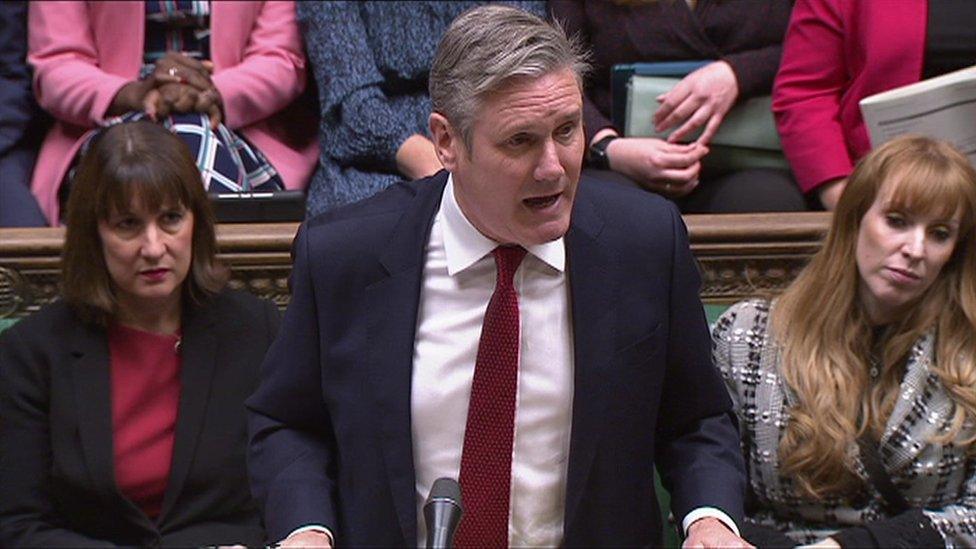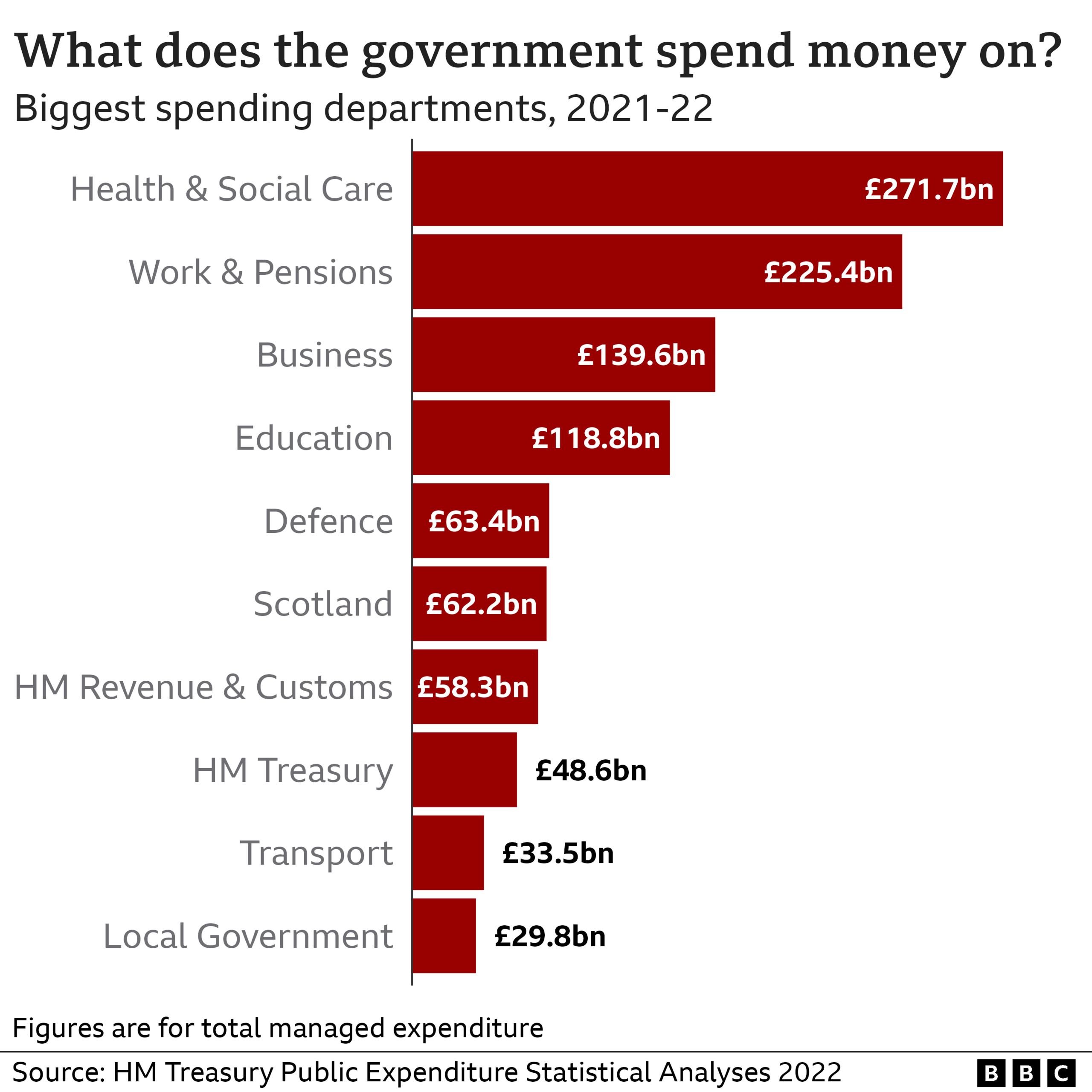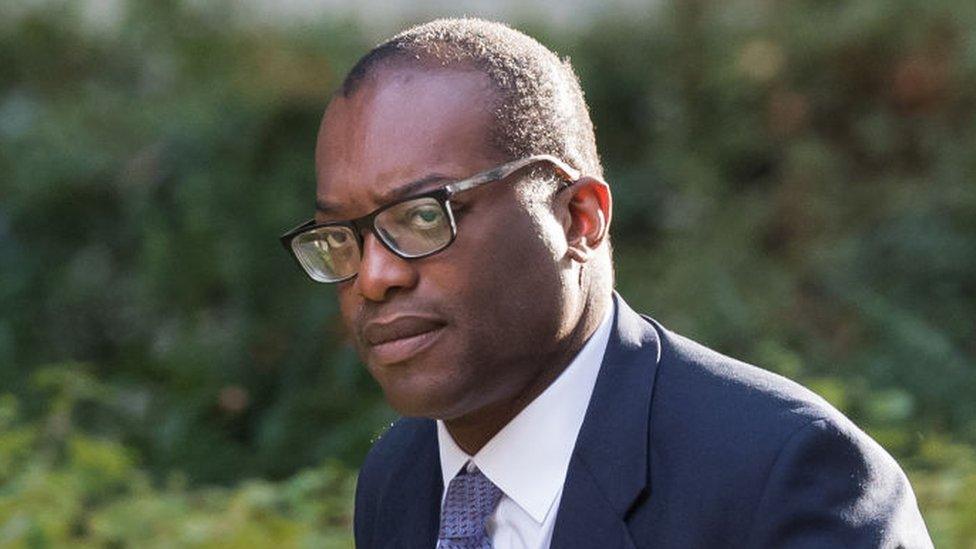Liz Truss pledges no public spending cuts as she defends mini-budget
- Published
- comments
Liz Truss says she "absolutely" rules out making cuts to public spending.
Liz Truss has said she is "absolutely" not planning public spending cuts.
Since the chancellor's tax cutting mini-budget last month, markets have been waiting to find out how the government proposes to bring down debt.
Ms Truss has now said the government will focus on reducing debt "not by cutting public spending but by making sure we spend public money well".
Sir Keir Starmer said the government's "borrowing spree" had left homeowners worried about their mortgages.
Speaking during Prime Minister's Questions, the Labour leader called for a reversal of the mini-budget, which set out plans for £43bn borrowing to fund tax cuts intended to stimulate economic growth.
The Institute for Fiscal Studies think tank has warned the chancellor will need to make spending cuts to put the country's finances on a sustainable path, saying the government would have to spend £60bn a year less by 2026-27.
Kwasi Kwarteng has promised the government's economic plan will be outlined on 31 October, accompanied by an assessment by the independent Office for Budget Responsibility.
Sir Keir asked Ms Truss if she stood by her pledge, made during her leadership election, that "I'm not planning public spending reductions".
The prime minister replied: "Absolutely. What we will make sure is that over the medium term the debt is falling. But we will do that not by cutting public spending but by making sure we spend public money well."
Later, the prime minister's spokesman said there would be "difficult decisions" for the government regarding public spending, and the chancellor would announce measures "in due course".
The government has previously said it is committed to spending settlements set out in the 2021 Comprehensive Spending Review (CSR)., external
Mr Kwarteng said earlier this month: "I think it's a matter of good practice and really important that we stick within the envelope of the CSR."
The review set out plans for increases in public spending which were then above inflation. But with prices now rising and inflation at 9.9% in August, government departmental budgets will come under pressure.
The prime minister's official spokesman has so far refused to confirm whether departmental budgets will stick to the below inflation increases set out in the CSR.
Privately several senior government figures have acknowledged there will be "belt tightening" in departmental budgets.
Reporters repeatedly asked if public money being spent on the energy price cap freeze explains how the government can say that there will not be spending cuts, when belts are expected to be tightened.
Given the size of the intervention in the energy markets, there would still be capacity for significant cuts in some budgets, while allowing the PM to accurately say that overall government spending had increased.

Sir Keir said the prime minister needed to "stop ducking responsibility".
He told her: "Does she think the public will ever forgive the Conservative Party if they keep on defending this madness and go ahead with their kamikaze budget?"
Ms Truss hit back, asking whether Labour would reverse the government's support for energy bills.
The PM said: "We are seeing interest rates rising globally in the face of Putin's appalling war in Ukraine.
"What we are making sure is that we protect our economy at this very difficult time internationally.
"As a result of our action - and this has been independently corroborated - we will see higher growth and lower inflation."
In the House of Commons later, answering questions from MPs on the economic situation, Chief Secretary to the Treasury Chris Philp said there would be "no real term cuts" in public spending.
"We do plan iron discipline when it comes to spending restraint," he added.
Treasury Select Committee chair Mel Stride called on the Treasury to "come forward with a further rowing back" on the tax announcements in the mini-budget.
Mr Stride, who is Conservative MP for Central Devon, said the Chancellor had "a huge challenge" to reassure the financial markets with his 31 October statement.
"He has to get the fiscal rules right, he has to come forward with spending restraint and revenue raisers that are politically deliverable," Mr Stride said.

Conservative MPs are already discussing ways to change elements of the mini-budget, former senior cabinet minister Damian Green has told the BBC.
He told Radio 4's PM programme: "It is indeed a topic of conversation around the tea rooms of the House of Commons as well, because we can all do the rough maths."
The government's growth agenda and deregulation plans needed to be "done in an appropriately politically sensitive way", he said.
"At the very least you need to have put to bed the thought that the markets might erupt at any moment in the background, which would put the whole project in jeopardy."
Related topics
- Published17 October 2022

- Published12 October 2022

- Published11 October 2022

- Published20 June 2024
